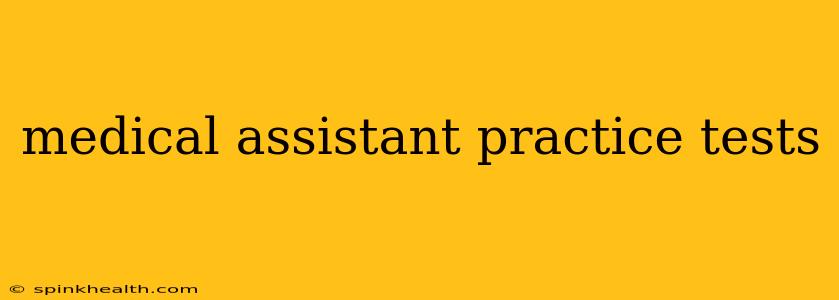The journey to becoming a certified medical assistant (CMA) is challenging yet rewarding. One of the most crucial steps in preparing for your certification exam is tackling practice tests. These aren't just about memorizing facts; they're about building confidence, identifying weaknesses, and fine-tuning your knowledge. This isn't just another run-of-the-mill practice test guide; it's a roadmap to success, filled with insider tips and real-world scenarios that will help you navigate the exam with ease.
Imagine this: you're in the exam room, heart pounding, sweat beading on your forehead. Suddenly, a question flashes before you, testing your knowledge of a specific medical procedure or a tricky pharmacology detail. The difference between success and failure often boils down to preparation. That's where practice tests come in, allowing you to simulate the actual exam environment and sharpen your skills.
Why are Practice Tests Essential for Medical Assistant Certification?
Practice tests offer an invaluable opportunity to assess your understanding of key medical assistant concepts and procedures. They aren't just about getting the right answers; they’re a diagnostic tool. By identifying your weak areas, you can focus your study efforts where they're most needed. This targeted approach helps you maximize your study time and boost your confidence. Think of practice tests as a dress rehearsal for the main event—the better your rehearsal, the smoother your performance on exam day.
What Types of Questions Can I Expect on a Medical Assistant Practice Test?
Medical assistant practice tests cover a wide range of topics, reflecting the diverse responsibilities of this vital role. You'll encounter questions on:
- Administrative Tasks: Scheduling appointments, managing patient records, insurance processing, and handling correspondence.
- Clinical Skills: Taking vital signs, performing EKGs, administering injections, assisting with examinations, and sterilizing instruments.
- Medical Terminology: Understanding and using medical terms correctly is crucial.
- Phlebotomy: Proper venipuncture techniques and blood collection procedures.
- Pharmacology: Basic knowledge of medications, their uses, and potential side effects.
- Legal and Ethical Considerations: Maintaining patient confidentiality (HIPAA compliance), understanding professional boundaries, and adhering to legal guidelines.
How Many Practice Tests Should I Take?
There's no magic number, but the more practice tests you take, the better prepared you'll be. Start with a few to get a feel for the format and identify your weak areas. Then, concentrate on those areas, and retake tests to measure your progress. The key is consistent practice and reviewing your mistakes.
Where Can I Find High-Quality Medical Assistant Practice Tests?
Numerous resources offer medical assistant practice tests, including online platforms, textbooks, and study guides. Look for tests that mimic the format and difficulty of the actual certification exam.
What to Do After Taking a Practice Test
Analyzing your results is just as important as taking the test itself. Don't just focus on the right answers; delve into the questions you missed. Understand why you got them wrong and review the relevant material. This iterative process is key to improving your knowledge and building confidence.
How Can I Improve My Score on Medical Assistant Practice Tests?
Consistent practice is crucial. Review the material regularly, focusing on areas where you struggled. Use flashcards for memorization, and create practice scenarios to simulate real-world situations. Consider studying with a group for additional support and diverse perspectives.
How Do Practice Tests Help Reduce Exam Anxiety?
Familiarity breeds confidence. The more practice tests you take, the more comfortable you’ll become with the exam format and the types of questions asked. This familiarity will significantly reduce your exam anxiety and improve your performance on exam day.
Are there Practice Tests Specifically for Different Medical Assistant Certifications?
Yes, some practice tests are tailored to specific certification exams, such as the RMA (Registered Medical Assistant) or the AAMA (American Association of Medical Assistants) exams. Ensure you're using tests that align with the certification you're pursuing.
Conclusion: Your Path to CMA Success Begins Now
Becoming a certified medical assistant is a significant achievement. By using practice tests strategically and effectively, you're investing in your future success. Remember, consistent practice, focused review, and self-assessment are the keys to unlocking your full potential. So, grab those practice tests, start practicing, and get ready to conquer your medical assistant certification exam!

